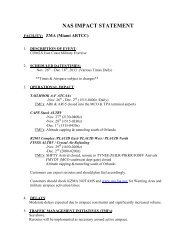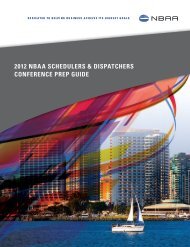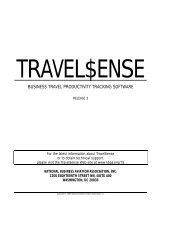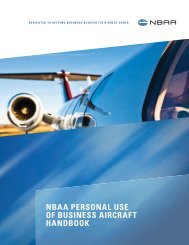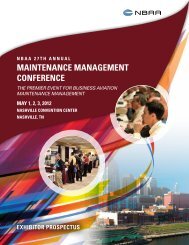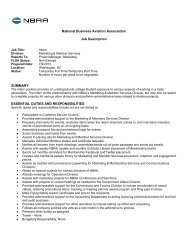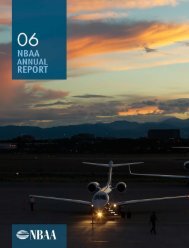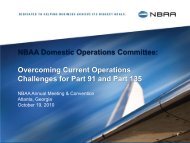Download the NBAA Best Practices for Air Charter Brokering
Download the NBAA Best Practices for Air Charter Brokering
Download the NBAA Best Practices for Air Charter Brokering
Create successful ePaper yourself
Turn your PDF publications into a flip-book with our unique Google optimized e-Paper software.
<strong>NBAA</strong> Membership<br />
of <strong>the</strong> customer air charter broker also should “flight<br />
follow” <strong>the</strong> aircraft with <strong>the</strong> customer’s representatives<br />
(as directed).<br />
• After <strong>the</strong> flight, <strong>the</strong> agent of <strong>the</strong> customer should verify<br />
<strong>the</strong> accuracy of all charges, facilitate <strong>the</strong> final collection<br />
of funds from <strong>the</strong> customer, remit payment to <strong>the</strong><br />
aircraft operator and follow up with <strong>the</strong> customer.<br />
• Brokers who collect federal excise tax (i.e., segment<br />
fees, percentage tax and international passenger taxes)<br />
should have knowledge of applicable IRS regulations,<br />
keep clear records in accordance with federal and state<br />
regulations <strong>for</strong> record retention and remit payments to<br />
IRS collection authorities as required. For more in<strong>for</strong>mation,<br />
review <strong>the</strong> <strong>NBAA</strong> Federal Excise Tax Handbook.<br />
• Advertising must be clear that <strong>the</strong> broker is not <strong>the</strong> direct<br />
air carrier. Also, any representations made by such<br />
an agent may be subject to DOT price advertising rules.<br />
The primary advertising rule en<strong>for</strong>ced by <strong>the</strong> DOT is its<br />
full price rule, found at 14 CFR 399.84. Its en<strong>for</strong>cement<br />
policy interpretations of that rule are found at http://<br />
airconsumer.dot.gov/rules/guidance.htm.<br />
<strong>Best</strong> <strong>Practices</strong> <strong>for</strong> Agent <strong>for</strong> <strong>Air</strong> Carrier<br />
In addition to following <strong>the</strong> regulatory and general best<br />
practices listed above, a broker acting as an agent <strong>for</strong> <strong>the</strong> air<br />
carrier should adhere to <strong>the</strong>se best practices:<br />
• An agent <strong>for</strong> <strong>the</strong> air carrier works at <strong>the</strong> request of <strong>the</strong><br />
charter operator to find customers and is an independent<br />
outside sales consultant paid by <strong>the</strong> charter operator<br />
in <strong>the</strong> <strong>for</strong>m of a percentage commission or o<strong>the</strong>r<br />
compensation arrangement. As agent of <strong>the</strong> air carrier,<br />
<strong>the</strong> broker cannot represent both sides (customer and<br />
air carrier) in <strong>the</strong> transaction.<br />
• Establish an agency agreement in writing with <strong>the</strong> air<br />
carrier be<strong>for</strong>e soliciting <strong>the</strong> customer, which includes<br />
<strong>the</strong> underlying terms and conditions of <strong>the</strong> agency relationship<br />
including <strong>the</strong> payment and commission terms.<br />
• The broker, in its capacity as an agent <strong>for</strong> <strong>the</strong> carrier,<br />
should <strong>the</strong>n enter into a charter agreement with <strong>the</strong><br />
customer that gives specifics of <strong>the</strong> particular flight or<br />
series of flight, such as:<br />
• <strong>Air</strong>craft type, aircraft age, aircraft tail number<br />
• <strong>Air</strong>craft charter rates<br />
• Clear notification of any charges that are not included<br />
in <strong>the</strong> estimated cost<br />
• Payment terms<br />
• If a deposit is required, funds should be held in a<br />
separate account<br />
• Cancellation policy, including policy <strong>for</strong> refund of<br />
deposits<br />
• Insurance, maintenance and crew provisions<br />
• Procedure used <strong>for</strong> collecting and remitting taxes to<br />
<strong>the</strong> appropriate agency<br />
• O<strong>the</strong>r terms and conditions<br />
• Advertising must be clear that <strong>the</strong> broker is not <strong>the</strong> direct<br />
air carrier. Also, any representations made by such<br />
an agent may be subject to DOT price advertising rules.<br />
The primary advertising rule en<strong>for</strong>ced by <strong>the</strong> DOT is its<br />
full price rule, found at 14 CFR 399.84. Its en<strong>for</strong>cement<br />
policy interpretations of that rule are found at http://<br />
airconsumer.dot.gov/rules/guidance.htm.<br />
<strong>Best</strong> <strong>Practices</strong> <strong>for</strong> Broker as Middleman<br />
The broker as a middleman acts as a “finder” in that it<br />
provides a value-added service <strong>for</strong> <strong>the</strong> customer by screening<br />
charter operators, identifying qualified aircraft and crew,<br />
and making recommendations to <strong>the</strong> customer.<br />
The key difference between <strong>the</strong> middleman and <strong>the</strong> agent<br />
is that <strong>the</strong> middleman simply “introduces” <strong>the</strong> charter customer<br />
to <strong>the</strong> charter operator so that <strong>the</strong> customer can <strong>the</strong>n<br />
negotiate and finalize <strong>the</strong> arrangements/agreements <strong>for</strong> <strong>the</strong><br />
flight(s) on its own, while an agent <strong>for</strong> <strong>the</strong> customer takes a<br />
more active role in negotiating <strong>the</strong> charter contract with <strong>the</strong><br />
charter operator and signing <strong>the</strong> charter contract, as agent<br />
<strong>for</strong> and on behalf of its customer.<br />
The middleman does not act as <strong>the</strong> agent of <strong>the</strong> customer<br />
or <strong>the</strong> agent of <strong>the</strong> air carrier. To avoid running afoul of<br />
regulatory requirements, any broker acting as a middleman<br />
should exercise caution to ensure <strong>the</strong>y are not taking on <strong>the</strong><br />
roles and responsibilities of an agent <strong>for</strong> ei<strong>the</strong>r <strong>the</strong> customer<br />
or <strong>the</strong> air carrier.<br />
In addition to following <strong>the</strong> regulatory and general best<br />
practices listed above, a broker acting as a true middleman<br />
should adhere to <strong>the</strong>se best practices:<br />
• Recognize that in <strong>the</strong> air charter broker’s role in this<br />
middleman scenario, <strong>the</strong> broker is introducing <strong>the</strong><br />
parties (charter operator and customer) to each o<strong>the</strong>r<br />
and facilitating <strong>the</strong>ir contractual arrangement. As such,<br />
<strong>the</strong> broker is nei<strong>the</strong>r <strong>the</strong> agent of <strong>the</strong> customer nor <strong>the</strong><br />
agent to <strong>the</strong> air carrier. Moreover <strong>the</strong> middleman is not<br />
involved, in any way, with <strong>the</strong> provision of air transportation,<br />
and <strong>the</strong> customer pays <strong>the</strong> broker separately <strong>for</strong><br />
its services.<br />
• Assist <strong>the</strong> customer and/or <strong>the</strong> air carrier as <strong>the</strong>y<br />
identify <strong>the</strong>ir needs in order to properly match available<br />
aircraft with <strong>the</strong> specific flight request’s mission<br />
requirements. Basic preliminary in<strong>for</strong>mation required to<br />
determine potential aircraft are, among o<strong>the</strong>r things:<br />
• Date(s) of flight<br />
• Number of passengers traveling<br />
• City destination(s)<br />
• Preferred cabin amenities<br />
• Special requests/needs<br />
• Assist <strong>the</strong> customer and/or air carrier as <strong>the</strong>y identify<br />
ideal aircraft that would fit <strong>the</strong> mission’s requirements.<br />
Verify through resources such as Business & Commercial<br />
Aviation magazine’s Operations Planning Handbook<br />
6 <strong>NBAA</strong> <strong>Best</strong> <strong>Practices</strong> <strong>for</strong> <strong>Air</strong> <strong>Charter</strong> <strong>Brokering</strong>



